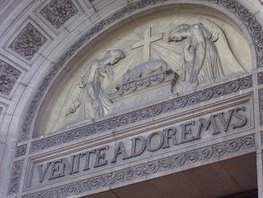Gedankenexperiments (thought experiments)
This is a proto-thought, so I don't intend it to be well fleshed out...
It seems that part of the problem that occurs between the Theologian (theist) and the Atheologian (atheist) is due to differing ideas of the utility of Gendankenexperiments...
I maintain that we should work from a system without contradiction. If there is such a thing, there should be no discussion that we presently exist in one (if there is not such a thing, then the premises of logic seem pointless).
In such a case, if we are to discuss the existence of God, would it not be most pertinent to question that hypothesis within the system, and determine if it is consistent in the system? Though one might claim that discussion of hypothetical world systems where God created so-and-so or everyone perfect (such that free will never lead to any choice of evil or the complete lack of any evil), is pertinent to such a discussion, I would say that one can not admit relevance of such a hypothetical, without establishing prior that one can do so without logical contradiction.
If we already have a system we imagine is non-contradictory. then should we not start in that system. Even if we are not fully aware of every aspect of this system, we assume this system is non-contradictory, and thus by basing our information off of this system, we minimize the amount of variability when we are questioning a hypothesis, such as the existence of God.
Starting from intellectual scratch seems prone to contradictions, obvious or implied. As I hold the Atheologian's position on Theodicy has.
This is why I propose that for the clarity, Plantinga's method of showing the impossibility of any world but ours seems promising for future theologians. (A concise and approximate summary of Plantinga's method is: There is a person Bob who makes the free will decision to dance because he's happy right now. Now if we analyze every other "possible world" we find that it is impossible for Bob to NOT dance right now, given that he's happy, has free will and that Bob would dance right now if he is happy. God could make Bob dance, but then Bob would not have free will. If Bob does NOT HAVE free will in this world, where he HAS free will, then this is a contradiction, and this world can not exist. On the other hand, Bob could make the free will decision not to dance, but we have already stated that if he is happy he will dance, and we know that he is happy, so that this possibility is also IMPOSSIBLE, as it creates another contradiction, namely that he decides with his free will NOT TO dance, even though he will decide with his free will TO dance.)
This is by no means a support of Plantinga... I think his idea is heading in the right direction, but I believe his premises are rife with problems... mostly due to his discontinuity with traditional Theology.




No comments:
Post a Comment